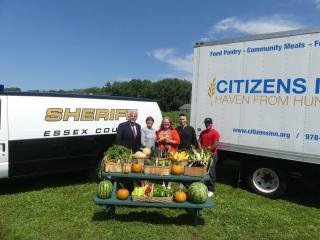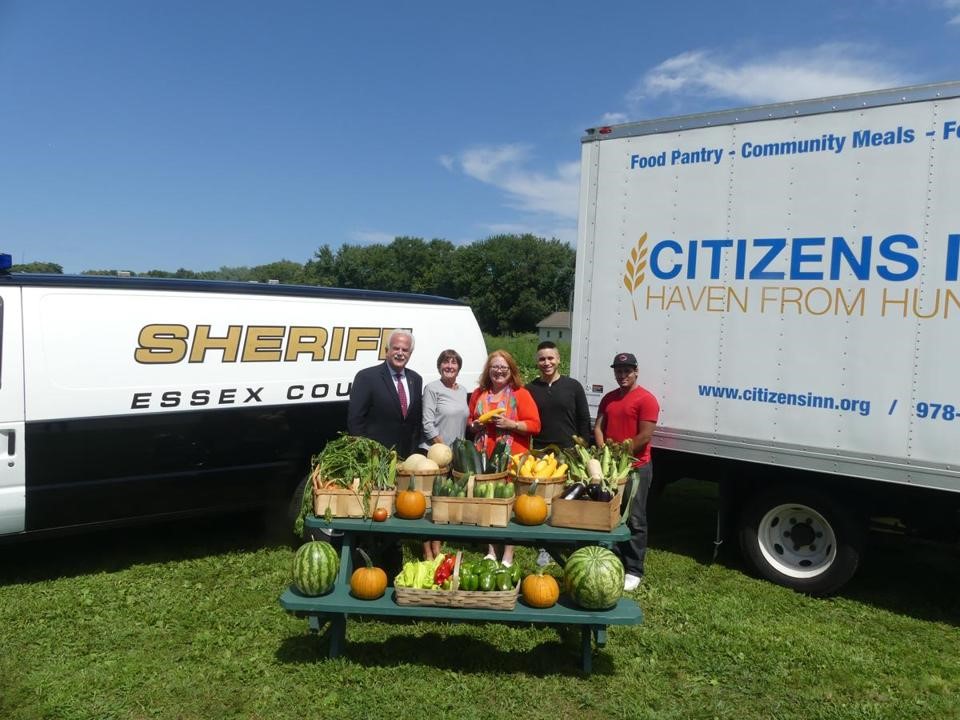INMATES GET FRESH OUTLOOK WORKING ON FARM


From left, Sheriff Kevin Coppinger and department director of food services Kathy Lawrence meet with program director Kate Benashski, Carlos Zagada, and Josiel Cabrera from Haven From Hunger on the farm at the Essex County Pre-Release Center in Lawrence.
By Morgan Hughes
GLOBE CORRESPONDENT SEPTEMBER 21, 2018
Drive around the back of the Essex County Pre-release and Re-Entry center in Lawrence, and you’ll find 6 acres of pumpkins, corn, tomatoes, peppers, and gourds.
Inmates at the center run the farm, which yields about 50,000 pounds of produce each season to feed others who are incarcerated and the wider community. Located just behind Interstate 495, the farm is fertile ground for personal growth.
“We’re giving jobs to the inmates, we use the crops, but it’s also an opportunity to give back to the community,” Sheriff Kevin F. Coppinger said.
At the moment, the farm has about seven inmates who volunteer to plant, maintain, and harvest the produce. They feed not only the roughly 200 inmates at the pre-release center, but those at the Middleton House of Correction and Women in Transition, a women’s pre-release center in Salisbury.
The facility purchases meals from a third-party food vendor, but the kitchen incorporates the fresh produce into the menu whenever possible.
“They live there, so they can really see the fruits of their labor,” Coppinger said.
About 30,000 pounds go to food pantries and homeless shelters in the Merrimack Valley and throughout the North Shore, said Kathy Lawrence, director of food services for the sherrif’s department.
In October, the farm will donate thousands of pumpkins — which are grown on about one-third of the acreage — to local schools and community organizations for the fall season.
Lawrence oversees the kitchen, dish room, and dining room at the pre-release center. Between meals, she heads out to the farm to talk with inmates and supervisors about which vegetables can be used on the menu.
“It’s economical in some ways,” she said. “What we can do sometimes is either incorporate it into the menu and serve it in addition to what’s being prepared, or we can substitute in ratatouille instead of giving them frozen green beans.”
But even when the harvest is over and the ground begins to freeze, these hyperlocal vegetables are used throughout the year, Lawrence said. Bell and Italian peppers are frozen to use in casserole dishes. The butternut squash is also kept in the freezer and saved for special holiday meals.
Heather Bonanno-Baker is manager of both Pleasant Valley Gardens in Methuen and the farm at the pre-release center. She took over duties from her father, who helped inmates run the farm for at least 15 years.
She said she teaches inmates how to plant and water the crops, manage pests, and harvest at the end of the season. She shows them what a vegetable looks like when it’s ready to be picked, and how to wash it before it goes to a kitchen.
“I’m big into teaching the public about agriculture, growing your own food, and where it comes from,” Bonanno-Baker said. She said she’s happy to be able to teach a new skill to the inmates that they can take with them when they’re released.
“A lot of them come from backgrounds where they grew up with a garden, or had one at their own house,” she said. “Some of them feel more at home in the garden.”
When Lawrence collected some feedback from the farm workers, she said some common themes were “a sense of pride in what they’ve grown” and feeling rewarded to be able to give back to the community. One told her: “Hard work leads to positive results.”
Lawrence teaches ServSafe to inmates working in the kitchen, a certification in food safety necessary for many jobs in the food industry. Coppinger said working on the farm provides another skill they could use to find a job when they are released.
“From the minute you arrive at intake in Middleton, to when you are about to be released at the pre-release center is trying to get them in better shape to get out of here and not come back,” he said. “I always like to say, ‘Thanks for coming, but don’t come back.’”
Morgan Hughes can be reached at morgan.hughes@globe.com.

